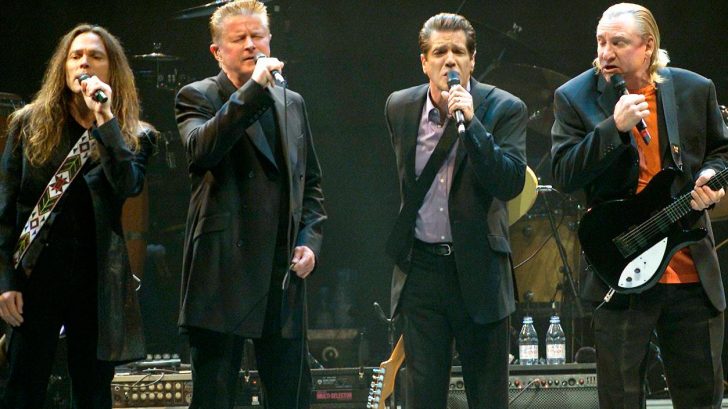The Eagles’ music is often associated with carefree days spent in the sun, but behind the scenes, the band was plagued by bitterness and resentment towards each other. Despite their onstage unity, there was always tension between band members, including disputes over songwriting credits and personal conflicts.
This negativity translated into their music, with a bitter undertone present in all their albums. On tour, things only got worse as drug and alcohol use exacerbated existing tensions, leading to a disastrous show in Long Beach. Even during their reunion tour, disagreements persisted about the band’s legacy and songwriting royalties. Although the Eagles had a winning formula for creating hits, their success was often marred by the drama and conflicts that surrounded the band.
Eagles x Joe Walsh
In the early ‘90s, there was a possibility of an Eagles reunion, with all members showing interest except for Joe Walsh. After struggling with his solo career and personal issues, Walsh was not in a good state and surrounded himself with people who enabled his behavior. However, the band was persistent and gave him an ultimatum – to get sober or not be part of the group. Eventually, Walsh overcame his struggles with alcohol and made his first sober appearance with the band on MTV. Although it was challenging for him to perform without being under the influence, he persevered.
https://www.youtube.com/watch?v=S8XDxNTjJk4
Eagles x Bernie Leadon
Glenn Frey had a vision of Eagles being a band that blended different genres of music from the beginning. Even though the band explored genres such as folk and country, Frey always wanted to infuse rock and roll into their music. However, bandmate Bernie Leadon, who came from a country background, was not interested in rock music. This became more apparent as they began to move towards harder material. Leadon felt the pressure of the band’s growing popularity, and on one occasion, he even walked out of the studio in the middle of a session because he disliked the song. When Frey discussed the band’s future, Leadon poured a beer over his head backstage to express his frustration. Though he later expressed regret about that incident, the decision was made to add Joe Walsh to the band after touring with his solo act, and the Eagles never looked back.
https://www.youtube.com/watch?v=UZm7m74b3AE
Glenn Frey x Randy Meisner
Bass players in rock and roll are usually laid-back individuals who prefer to serve the song instead of drawing attention to themselves. However, in the Eagles, every member was expected to take turns singing lead vocals. Randy Meisner’s vocal highlight was “Take it To the Limit,” but he became nervous about hitting the high notes towards the end of the song. When he expressed reluctance to sing it, Glenn Frey scolded him, saying that there were millions of people waiting to hear him perform it. Tensions between the two escalated during the Hotel California tour, and eventually, Meisner left the band. Timothy B. Schmidt took his place and brought a more relaxed vibe to the band’s final album, The Long Run.
Glenn Frey x Don Felder
Don Felder was a hired musician for the Eagles, but his talent led to him being asked to join the band. As success grew, he felt bitter about not receiving enough credit in the studio. Tension boiled over during a performance in Long Beach when Felder made a derogatory comment to Senator Alan Cranston, resulting in a physical altercation between Felder and Glenn Frey on stage. Frey announced the end of the Eagles shortly afterward, feeling that years of resentment and tension had taken a toll on the group.
https://www.youtube.com/watch?v=8RSDnL-MC3g
Don Felder x Reunion
Although band breakups are not always permanent, as long as all the original members are alive, they can get back together for impromptu performances. Don Felder was willing to join the Eagles reunion after the success of their live album Hell Freezes Over, but when he found out that he was getting paid significantly less than his bandmates, he became unhappy. Despite staying with the band for a few more shows, the unequal treatment and long-standing resentment ultimately caused him to leave the band again.

